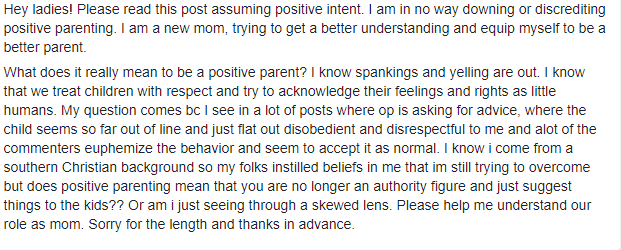|
Positive Parenting is often confused with permissive parenting, by those who are mostly familiar with authoritarian parenting. Someone with a traditional Southern Christian background most likely grew up in an Authoritarian household in which the parents made all decisions, and the children complied. Children's feelings, opinions and suggestions were ignored, or silenced. Emotional, physical and developmental maturity weren't/ aren't taken into consideration, which results in children either failing to meet parental expectations, or children maturing quickly to prevent unwanted physical and verbal punishments from authority figures.
Anyone growing up in this environment is likely to normalize the actions of the parents as acceptable because it produces results. Unfortunately those results often come with emotional baggage that is passed along from generation to generation. Not everyone who says that they follow positive Parenting philosophy practices Authoritative parenting. For some, Positive Parenting is not spanking, for others positive parenting is not cursing at their children, and for others, positive parenting is spanking, and not beating a child. None of those are positive, and they don't conform to the works and philosophies of Alfred Adler, Diana Baumrind and Rudolf Dreikurs whose writings and research form the basis of Positive Parenting. Positive Parenting is HARD work, and there are boundaries and guidelines that parents must consistently enforce. A parent can't look the other way when they are tired. Parents must address negative and positive behaviors as they occur, and turn every moment into a teaching moment. Discipline means to teach, and teaching is at the heart of Positive Parenting. Without discipline, normal age appropriate childhood behaviors continue beyond the time in which they are acceptable. For example, It is normal for a two year old to have a display of emotions, also known as a tantrum. However, parents must use those moments to teach children how to express themselves, and also how to regain and keep their composure when angry. A toddler won't learn this lesson in one month or even six months, but as they grow they will take something from each teachable moment and one day they will not have a tantrum when faced with a difficult situation. Keep in mind, that in the Black American community, having an opinion or a point of view different than that of the parent or other adult is considered disrespectful, or talking back. Were you ever wrongly punished because your parents refused to listen to what you had to say? Did you have difficulties expressing your opinions to older adults even once you became an adult because you did not want to appear disrespectful or reproached for talking back? Children like adults have opinions, experiences and perspectives, that deserve attention. Listening to your child, does not mean that you have to or will do what your child asks. It simply means that you value them enough to consider what they have to say. Positive Parents don't expect immediate compliance, they look for continued growth and praise the growth as it occurs. Positive Parents want their children to enjoy their childhood, but they also want to guide their children towards independence. Positive Parenting relies on parents serving as authority figures, but those figures use their life experiences to guide their children with mutual respect, proactive parenting, positive discipline, healthy attachment, compassion and empathy, instead of totalitarian control.
0 Comments
|
From the FacePositive Parenting answers to the hottest parenting questions presented in the Facebook group A Nurtured Child. Archives
April 2021
Categories |

 RSS Feed
RSS Feed
